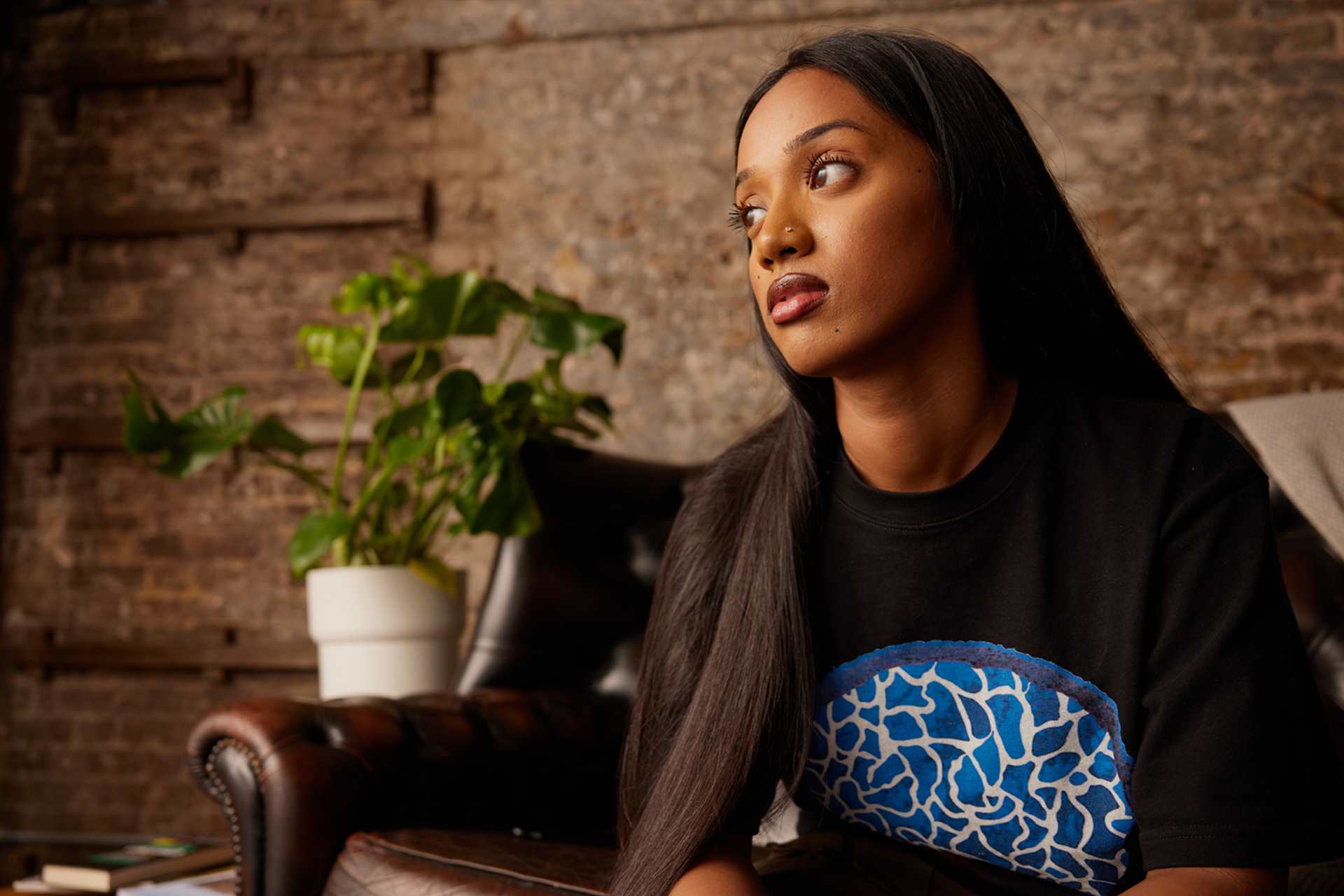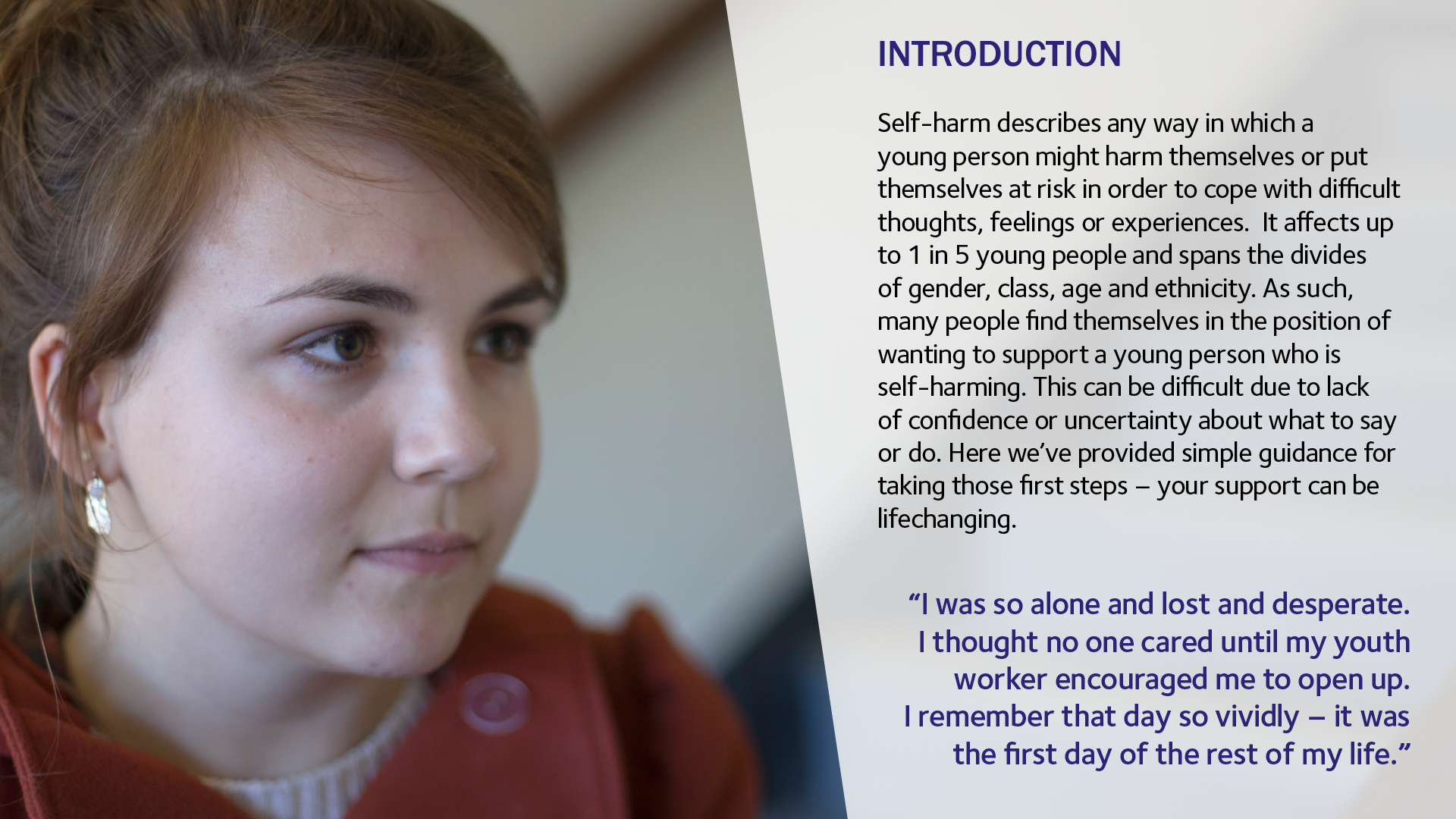
- For:
- Community support,
- Youth workers
Self-harm affects thousands of young people in the UK. It’s often a sign of another mental health problem as it is used as a means of relief or escape. It’s dangerous too and can potentially be fatal. As part of our No Harm Done project, these resources provide advice, tips and practical steps to help professionals respond to self-harm in the young people that they work with.

Thousands of children and young people in the UK self-harm, and the problem spans the divides of gender, class, age and ethnicity.
As such, many people find themselves in the position of wanting to support a young person who is self-harming. This can be difficult due to lack of confidence or uncertainty about what to say or do.
Here we’ve provided simple guidance for taking those first steps – your support can be life-changing.
Document type: PDF
Document size: 16.4MB
This film is a response to the powerful cry for help from young people, parents and professionals who have told us just how difficult dealing with self-harm is. The films were co-produced with young people, parents and professionals to reassure those affected by self-harm that things can and do improve.
Trigger warning: talk of self-harm.
The first time I spoke to a student about self-harm, I felt the weight of responsibility to get it right and have all the answers. I realised that I needed to enlist the support of other people and I realised that I needed support not just with her but also with my reaction to dealing with self-harm.
YoungMinds trainer Liz Raynor talks about her experience of supporting young people who self-harmed and how the No Harm Done digital packs can help.
Cheryl hadn’t answered my texts over the past week and although this was not unusual, I was relieved when she appeared at the car window only ten minutes late before climbing in and switching the radio on. Cheryl was one of the young people I worried most about between sessions. She was extremely vulnerable and lived a chaotic life with frequent changes to her accommodation and her relationships.
We chatted about where to go for food and what to do afterwards while Cheryl fiddled with the dials of the radio. It wasn’t until Cheryl had finished her burger and was half way through her fries that she told me that she had been admitted to hospital earlier that week. She couldn’t remember how many tablets she had taken, but her flatmate later told her he had found her on the sofa and called an ambulance. Cheryl had been admitted to a ward but had walked out of hospital the following day. She was 18.
Cheryl was one of the young people I worried most about between sessions.
I knew Cheryl self-harmed, we had spoken about it before. The information had been shared with all the professionals working with Cheryl including her social worker and the staff of the unit she had recently moved out of. Concerns had been shared, procedures had been followed and Cheryl herself was open about her self-harm.
In this moment though, I was keenly aware of my own emotions; mindful that despite my continuing to listen calmly, I felt overwhelming sadness for the young person sat next to me draining the last of her coke and tidying up the rubbish from her meal.
Earlier that week I had been delivering training on self-harm to practitioners from a local authority. I had listened to participants talk about working with young people who self-harm, sharing their feelings of fear, compassion, anger, frustration and helplessness.
My own reaction is not unusual. However experienced we may be in working with young people, however many conversations we might have with young people about self-harm, their stories are all different and will impact on us differently.
I was keenly aware of my own emotions; mindful that despite my continuing to listen calmly, I felt overwhelming sadness for the young person sat next to me.
The No Harm Done digital packs provide practitioners with guidance as well as tools and strategies to support young people who self-harm. A fundamental part of the guidance is the reminder to all of us to look after ourselves.
Supporting vulnerable young people can be emotionally demanding and affect us in ways we don’t anticipate. It is important to create time and opportunities for activities which build our resilience, whether this is a drink with friends or a walk on the beach. We need to look after ourselves in order to support the young people we work with.
We need to look after ourselves in order to support the young people we work with.
Whether you love the page or think something is missing, we appreciate your feedback. It all helps us to support more young people with their mental health.
Please be aware that this form isn’t a mental health support service. If you or a young person you work with is in crisis right now and wants to talk to someone urgently, find out who to contact on our urgent help page.
At YoungMinds we take your privacy seriously. If you’d like to read more about how we keep the information we collect safe, take a look at our privacy policy.